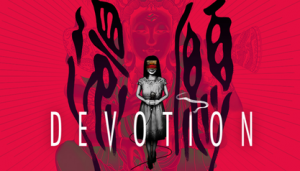A popular horror game from Taiwanese developer Red Candle Games has been denied a platform once again for initially including a hidden reference comparing Chinese leader Xi Jinping to Winnie the Pooh.
The game, Devotion, had been set for a re-release by the digital storefront GOG, only for the platform to announce hours later that it would not be listed after all.
“After receiving many messages from gamers, we have decided not to list the game in our store,” GOG tweeted on Wednesday.
Devotion was pulled from the platform Steam in February of last year after Chinese gamers discovered an Easter egg showing an ancient Taoist wall scribble reading “Xi Jinping, Little Bear Winnie.” Xi is notoriously sensitive to memes highlighting his likeness to the cartoon bear.
At the time, Red Candle Games quickly apologized and said the text was a placeholder that should never have been released. The developer later issued an additional apology, saying it “failed our players’ anticipation and offended many others due to the said mistake.”
But Devotion was never relisted on Steam and became an example of how the Chinese government’s objections to Taiwanese expression often hurt those with the most to lose.
The game went without a home until Red Candle Games announced it would be hosted on GOG on Wednesday. But that glimmer of hope for Devotion fans lasted for all of a few hours.
“We are willing to understand and respect GOG’s decision,” the developer wrote on Twitter on Thursday. “This is a difficult predicament to overcome, but we won’t stop striving.”
The news has infuriated gamers, who have become used to controversies involving Chinese censorship.
Last year, the U.S. gaming company Blizzard Entertainment banned a professional Hearthstone player for Hong Kong for shouting the protest slogan “Liberate Hong Kong, revolution of our times!” during a postgame interview. Gamers also discovered last year the popular game League of Legends prevented users from including the word “Uyghur” in their status messages.
The megahit Animal Crossing disappeared from online and physical stores in China in April for unknown reasons, although some users speculated it happened after Hong Kong pro-democracy figures such as Joshua Wong publicized their fondness for the game.
In October, players of Genshin Impact found that mentions of “Hong Kong” and “Taiwan” were being censored in the game.
And earlier this week, the highly anticipated game Cyberpunk 2077 – available on GOG – found itself embroiled in controversy after its online encyclopedia described Taiwan as “not really a country and it’s not actually a part of China.”
The Cyberpunk controversy in particular could have spelled doom for Devotion. GOG, like all game developers, relies heavily on the lucrative Chinese market.
But selling games in China requires tiptoeing through the minefield of Chinese censorship. In the past, Chinese gamers have been quick to flag potential offending issues with popular game releases, in part because they fear their favorite platforms and developers being banned by the Chinese government.
It is unclear what comes next for Devotion, which is once again without a home – even if it long ago removed its offending reference to Xi Jinping’s likeness to Winnie the Pooh.

































